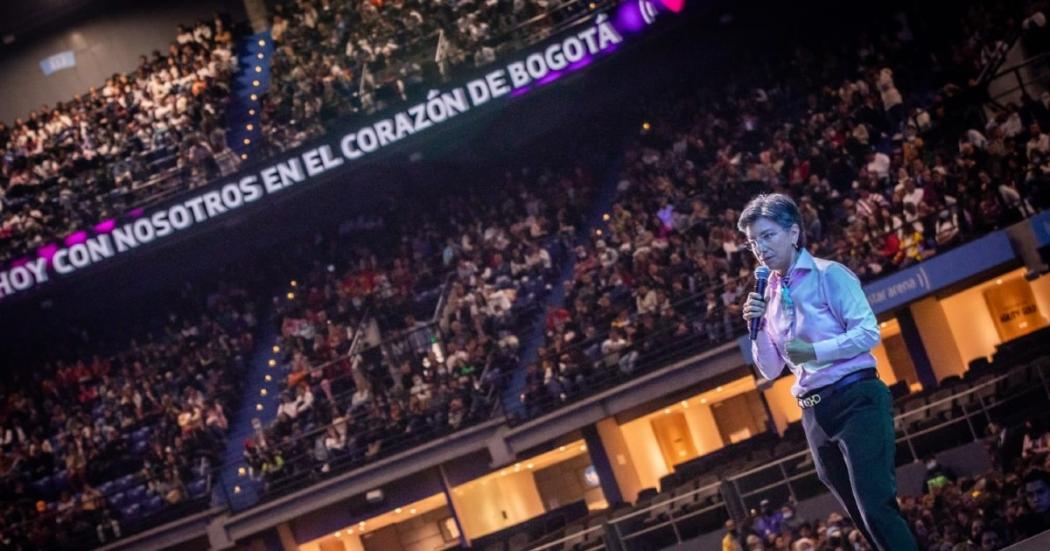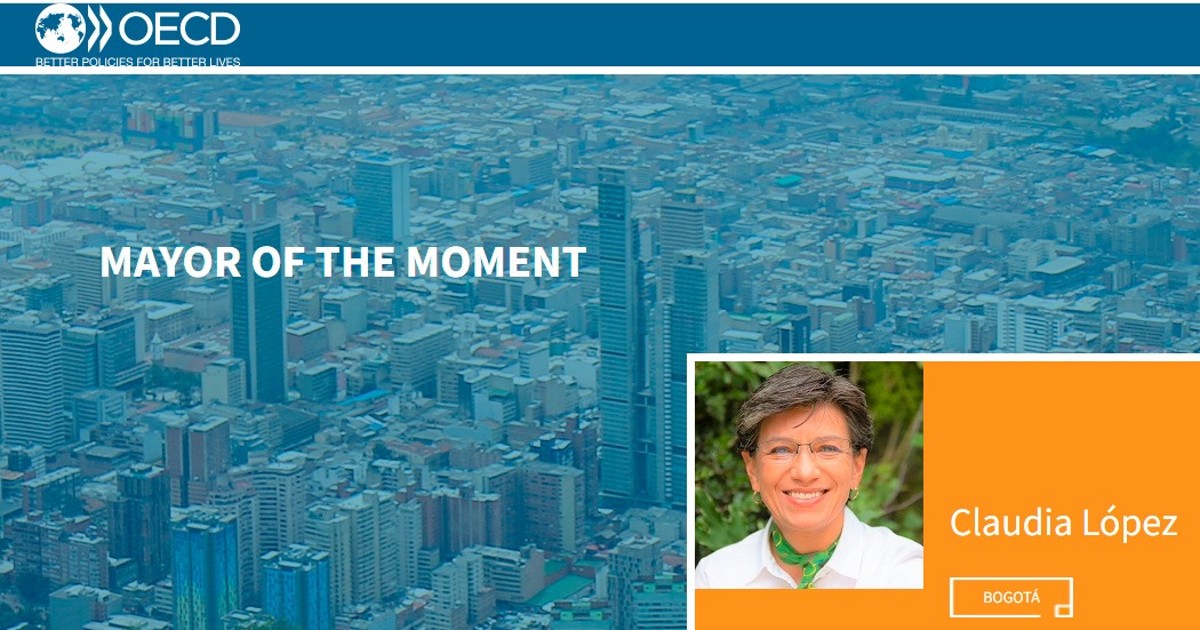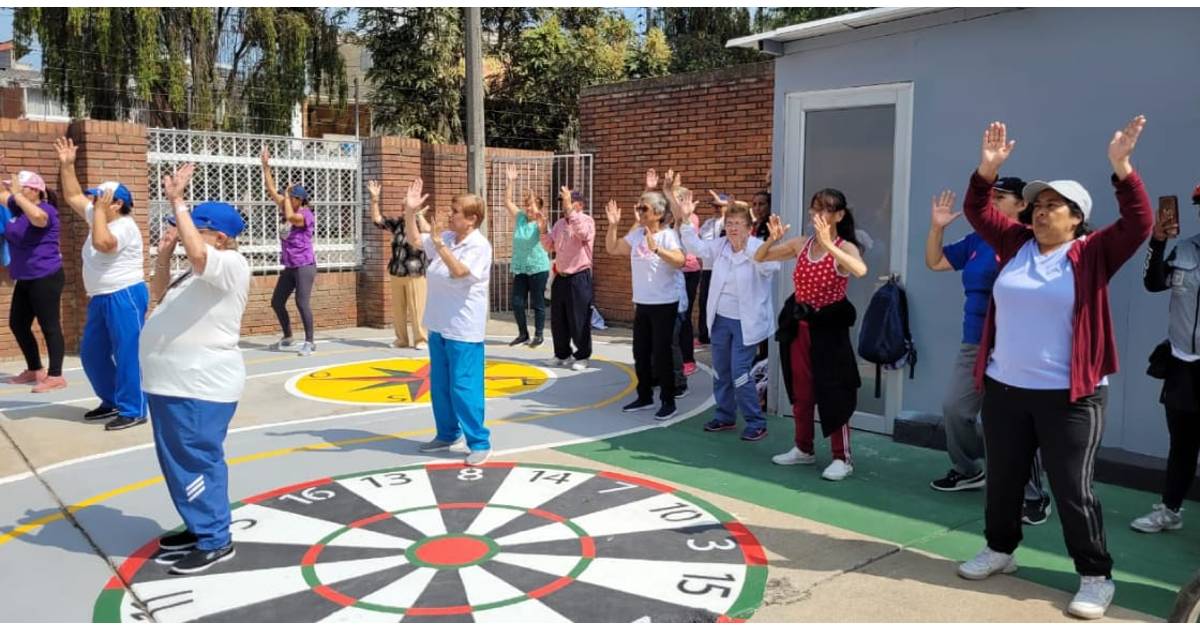From the Movistar Arena, the Mayor of Bogotá, Claudia López, reported to citizens on the progress made in implementing the Development Plan: A New Social and Environmental Contract for the 21st Century Bogotá.
"We are here to tell you how we are doing, where we have improved, and where we need to improve. We are here to thank all the young people, women, entrepreneurs, and families of Bogotá because thanks to your taxes, contributions, and initiatives, we have managed to overcome the pandemic, death, poverty, and unemployment; and move forward after these three challenging but also exciting years," Mayor Claudia López said to more than 10,900 attendees during the Accountability Report.
During her speech, Viviana Barberena, the City Overseer of Bogotá's Veeduría Distrital, recognized the city's efforts towards improving employability. "The unemployment rate has also been reduced and the employment rate has grown", said the official, who also recommended to continue advancing to lower the rates of labor informality.
The City Overseer reiterated that "support has also been provided to 20,000 micro, small, and medium-sized enterprises (MSMEs), efforts have been made in the construction of schools, gardens, health centers, and we also recognize the progress in the construction of the First Line of the Bogotá Metro".
A new social contract: Care, health, education, protection, inspiration = Social Justice and Happiness
Over the past three years, the administration led by Mayor López has been characterized by its efforts to reduce extreme poverty and combat hunger in the city. During 2020, 2021, and 2022, 1.24 million poor and vulnerable households have received cash transfers through the Guaranteed Minimum Income (IMG) program, and by the end of 2023, it is expected to reach 1.27 million households.
In this tweet, Mayor López refers to the work on Care for and supporting women in the city:
Empezamos #BogotáRindeCuentas explicando cómo estamos cumpliendo nuestro contrato social:
— Claudia López Hernández (@ClaudiaLopez) March 23, 2023
• Creamos el Sistema de Cuidado donde usamos la infraestructura para cuidar mujeres, cuidar a quienes nos cuidan y hacer transformación cultural dirigida a los hombres: a cuidar se aprende! pic.twitter.com/WrhaJCR5Lz
In addition to the minimum income, people and households in poverty have received multiple social services and food support to prevent poverty and reduce hunger. 1.1 million people have been served in the different social services that the city has; 59% of them have been women.
It is highlighted that in the last 3 years, more than 226,000 people have benefited from comprehensive food support through the Zero Hunger strategy, through vouchers, dining rooms, and food baskets according to the needs of each vulnerable family.
Thanks to this administration's social strategy, multidimensional poverty was reduced from 7.1% to 5.7% in 2021. The District's programs allowed 278,000 people to escape multidimensional poverty and 327,000 from monetary poverty.
Bogotá is consolidating as a caring city. This administration launched the Care System, an institutional coordination model created by the City Hall to alleviate and redistribute care burdens, which historically are carried out by women. To date, 16 Care Blocks have been inaugurated, and it is expected to reach 20 by the end of this year. Additionally, there are 2 Care Buses for attention in rural and urban areas where there are no Care Blocks yet.
"A Care Block is a place where we take care of those whom they take care of, and take care of them, with rest activities, so they can watch a movie, read a book, study and finish their high school, learn digital skills, train in technical, technological or professional careers that allow them to generate income, get a job or start a business," detailed the Mayor.
This is one of the historical achievements of Bogotá. In total, over 230,000 people have been served, with 12,000 women graduating through training processes with the National Learning System (SENA), 86,000 enjoying well-being spaces, 7,000 receiving attention on the employment and entrepreneurship route, and additionally, 2,000 men participating in cultural change workshops. The city aims to reach one million services by the end of 2023.
The mayor highlighted that the Care System uses existing infrastructure that was previously designated for the care of children and youth. "In most cases, fathers, mothers, and caregivers had to wait until their activities were over, without being able to do anything. That is why the Care Blocks offer three types of services: caring for those who care, caring for them, and cultural transformation directed at the men of the household, because caregiving tasks can be learned."
With the services of the Care System, Bogotá continues to fulfill its commitments to recognize, reduce and redistribute unpaid care work equitably throughout society. This initiative is complemented by the system for attention and prevention of violence against women, children, and adolescents at risk. To date, 108,493 women victims of violence have received psychosocial and socio-legal attention in different services.
Likewise, six shelters were created for women at risk of extreme violence and femicide, four Immediate Reaction Units of the Prosecutor's Office that provide services with a gender perspective, and six Justice Houses with comprehensive care routes for women victims of violence. A total of 82,743 women have been assisted through the Purple Line, of which 76,124 have been effective.
Mayor López stated that harassment is a crime, not a gallantry. "I am very grateful to the City Overseer for her initiative to improve the aggravation of what corresponds to that crime. Today we attend to 95% of calls because the worst thing that could happen was for women to call a helpline and not receive a response," he said during the Accountability Report.
The territorial health model teams, "Health in My Neighborhood" and "Health in My Village," have attended to 845,294 people and 358,210 families. Additionally, 52,062 medications have been dispensed to homes. This is the first time that medications have been delivered to homes. By the end of 2023, the goal is to reach 90,000.
Here is a tweet in which the Mayor refers to the construction and expansion of hospitals and health centers:
#BogotáRindeCuentas en salud:
— Claudia López Hernández (@ClaudiaLopez) March 23, 2023
•Construimos y ampliamos 7 nuevos hospitales y 20 centros de salud
•52.062 personas vulnerables han recibido medicamentos en su casa
•Asumimos gobernanza del sistema en pandemia y aumentamos la disponibilidad de camas pic.twitter.com/CD6Ont0OGx
"We know that there are elderly people who find it difficult to leave their homes, and that is why we are taking the 'Health to my Neighborhood' (Salud a mi Barrio) program to provide them with medicines," she added.
In terms of healthcare infrastructure, the Tower 2 of the Meissen Hospital was delivered, as well as 8 health centers, and this year it is expected to close with a total of 5 hospitals and 13 health centers.
For this administration, education is in the first place. To date, the construction of 23 schools has been completed, of which 20 have been delivered and 3 are pending delivery. Likewise, 6 kindergartens have been delivered.
By the end of 2023, it is expected to complete 35 schools, 6 kindergartens, and also leave another 35 schools in progress and design. These educational infrastructure projects will benefit 54,000 preschool, primary, and secondary students.
"Young people in Bogotá need to ensure that education comes first from a very young age, and that's why this is the best figure we've achieved: Bogotá is committed to guaranteeing all children who seek it a school near their home, which is why we are building 35 schools and leaving 35 in progress," Mayor Claudia López said in the presentation of education achievements.
The education revolution came hand in hand with the Mayor's delivery of 112,837 electronic devices with internet connection and pedagogical support. This initiative, called 'Route 100 K Connect and Learn!' (Ruta 100K ¡Conéctate y aprende!), reduced the digital gaps in the capital city. By the end of 2023, it is expected to reach 133,000 devices delivered.
During the accountability event, the mayor highlighted that one of her most important achievements is having benefited more than 34,000 people with scholarships for post-secondary education, 26,300 young people with the 'Youth to the U' (Jóvenes a la U) program, and more than 8,000 with short-cycle training in the 'Everyone to the U' (Todos a la U) program. Likewise, in secondary education, 68,040 students have benefited from dual certification with National Learning System (SENA), and 1,070 have benefited from technical vocational training with the program 'The U at your school' (La U en tu colegio).
Similarly, the university immersion program 'Challenge to the U' (Reto a la U) was created with 20,333 young people involved. "The best university in Colombia and one of the best in the world is the National University, which took 100 years to have 57,000 students, and in these three years, we have done the equivalent of a National University with the scholarships that the city has given," celebrated the Mayor of Bogotá.
The Mayor also highlighted the 'Parceros' program, which has benefited 18,057 young people, of whom 72% are women (13,053). The goal is to reach 28,000 young people benefited by the end of 2023.
"'Parceros por Bogotá' is a six-month program that provides half a minimum wage to young people who neither study nor work, and they help us recover public space. It has psychosocial support, and when those six months are over, half of them go back to studying, get a job, or start a business," she said.
On the other hand, this administration has delivered 10,579 incentives and supports to the cultural and creative sector, as well as initiatives from the 'Is Local Culture' (Es Cultura Local) program. Three recreational sports centers have been delivered (Fontanar, San Cristóbal, and Cometas), and this year, the one in Chapinero will be delivered, and the construction of Gibraltar in the Kennedy locality will begin. Similarly, 415 parks and venues in the city have been modernized, equipped, and maintained.
It is important to highlight that by the end of this year, nearly 58,000 artistic and cultural activities will have been carried out in Bogotá with over 13 million participants.
"Creating a new social contract is about taking care, education, health, but also having culture, that's why we aim to bring culture, recreation, and sports to the most vulnerable neighborhoods, that's why we have implemented local culture support," commented López.
A new environmental contract: Metro, greening, Master Plan = sustainable eco-territorial planning
Bogotá is advancing in the construction of a public, mass, intermodal, clean, and regional transportation system, with the metro as its backbone.
The First Metro Line is considered the most important infrastructure project in the country and has an 18% progress. The workshop yard that will house the 30 trains has a 68% progress, the street 72 interchange has a 7% progress, and the relocation of networks has a 96% progress.
The project is 23.6 km long, has 16 stations and a capacity of 72,000 passengers per direction.
- Total value of the project: 22.3 billion Colombian pesos.
- 2.9 million people benefited
- 17,000 jobs per project
- Crosses 9 districts of the city
Regarding this mega-project for the city, the Mayor said that the First Metro Line of Bogotá is finally being built. "The Metro cannot stop. We have been trying to build the Metro for 50 years. Finally, it was contracted. The citizens of the Kennedy and Bosa districts know that when they have the Metro, it will take them half an hour," she said.
The Subterranean Metro Line 2 (L2MB) will benefit more than 2.9 million people. This is a project that has been declared of strategic importance for the Capital District and the Nation due to the impact it will have on the mobility of the country's capital.
It will have a length of 15.5 km, 1 workshop yard, and 11 stations, of which 10 will be underground and one elevated. This project will connect four localities in Bogotá: Chapinero, Barrios Unidos, Engativá, and Suba. The total value of the project is $34.9 billion Colombian pesos.
It will connect the northeast of Bogotá, from Calle 72 with Carrera 10 (maneuver tail), with the Fontanar del Río area in the west of the city, where the workshop yard will be located. By the end of 2023, it is expected to have the project contracted.
In the four years of district administration, 110 new kilometers of modern public transportation will be under construction and contracted, including 2 metro lines, 3 feeder trunks, 1 green corridor, 2 suburban trains-Regiotrams, 3 electric cables, and a bike path.
Western Tram (Regiotram de Occidente)
- The project is 39.6 km long, of which 14.7 km will be in Bogota and 24.9 km outside the city. It will have 17 stations and a capacity of 8,840 passengers per hour per direction.
- Total project value: 3.6 billion Colombian pesos.
- It will connect Bogotá with the municipalities of Facatativá, Madrid, Mosquera, and Funza.
As of now, the project is in a pre-construction phase with a 96% progress rate, with approved details, environmental licenses, land management, and the start of construction of the El Corzo workshop. The construction phase is expected to begin in April 2023.
North Accesses
- A 17.9 km. long project that will improve access roads in the north of the city. Inclusion of TransMilenio lane on the northern highway.
- 1.3 billion Colombian pesos investment
- Principal districts benefited: Usaquén and Suba.
The pre-construction stage is 47% complete, and by December, the project will have a 100% progress rate, and the work will commence.
ALO (West Longitudinal Avenue) South
- The project will improve the southwest exit of the city, with a length of 24.25 km and will connect Bogotá with the municipalities of Sibaté, Soacha, and Mosquera.
- Will benefit more than 2 million people
- Total project value: 1.2 billion Colombian pesos.
- Main districts benefited: Bosa and Ciudad Bolívar
The pre-construction stage is 58% complete, and by June, the project will have a 100% progress rate, and the construction phase will start by the end of 2023.
Calle 13
The Calle 13 is one of the most important corridors in Bogotá, due to its influence on the cargo sector. This renovation and expansion project includes an intermodal structure, with a predominance of public transport, bike lanes, public space, and mixed vehicular infrastructure. It will have a length of 11.4 km, 8 new lanes, 22 km of bike lanes, and over 180 square meters of public space.
- Total value of the project: 3.39 billion Colombian pesos.
- It will generate over 4,000 jobs per project.
- It will benefit more than 650,000 people.
- The districts that will benefit the most are Puente Aranda and Fontibón, as well as the municipalities (Facatativá, Mosquera, Madrid, and Funza).
San Cristóbal Cable
The San Cristóbal Cable is a project with a length of 2.83 kilometers and 3 stations along its route. The construction will be awarded in April 2023, and construction will begin in December.
During this government, the works on the Avenida 68 Trunk Road have been executed, which will have a length of 17 km and 21 stations. It has a progress of 26%, as well as the Ciudad de Cali Trunk Road, Caracas Trunk Road (extension), and the Carrera Séptima (Seventh street) Green Corridor
The latter project of mobility, urbanism, and eco-urbanism will provide a change and solution to the needs and demands of citizens who have demanded inclusive, sustainable, and equitable mobility in the center and northeast of the city for decades. This work will begin at the end of 2023.
It is important to mention that Bogotá currently has 617 km of cycling infrastructure built; it is expected that by December 2023, 780 km will be built.
"Building clean public transportation, with electric energy, cycling, is fundamental. That is why we unite the environmental contract with the contract for clean and sustainable mobility", said the mayor of the Capital District.
La Rolita
Bogotá inaugurated La Rolita, the first and only public transportation operator in the history of the city, composed of 100% electric buses with gender equity, where 50% of its employees are women who work in driving, technical, and administrative tasks, thus vindicating the role of women in traditionally masculinized roles, another important achievement of the administration of Claudia López.
La Rolita has its operations center in the Ciudad Bolivar district with 11 routes to 10 other localities. This administration has delivered to the city the largest electric fleet outside of China, consisting of 1,485 100% electric buses that currently run on the city's streets with zero emissions.
The Mayor reiterated that besides having social justice, environmental justice is also important. Therefore, she insisted on recycling, planting, and caring for the main ecological structure, "but the most important thing we must do is transform the way we move. If we continue burning gasoline, and diesel, and occupying a lot of space, it kills our lungs; a total of 2,000 people die each year from respiratory diseases".
A new social contract: Employment, economic growth = Freedom, empowerment, and sustainable progress
The economic recovery after the impact of the pandemic has been a significant achievement of the city's administration. Bogotá's Gross Domestic Product (GDP) grew by 9.3% in the third quarter of 2022.
So far in this four-year term, more than 90,000 microenterprises have been supported by the city with strengthening and financing programs. Through the Bogotá Local program, close to 12,000 productive units have been supported. In addition, more than 185,000 companies have been characterized and visited and almost 30,000 have been formalized.
Regarding the actions taken to advance Bogotá's economic recovery, the mayor reported that the city has provided economic support and technical assistance. "We have given money to small and micro-enterprises, and we have respected the work of informal vendors. It is not easy to be in the sun and rain, so we have helped them formalize their businesses, and new businesses that formalize will not pay taxes for five years," she commented.
In terms of employment, at the end of 2022, there were approximately 3.83 million employed in Bogotá, representing a 98.2% recovery in employment compared to the same period in 2019. The city administration has generated and managed more than 480,000 jobs, of which about 70,000 correspond to women and another 70,000 to young people.
"Women and young people were the ones who lost the most jobs, that's why we have Inclusive Employment, for 19 different population groups, and the more difficulties the person accumulates, the benefit increases. I always tell the people of Bogotá that the programs of the Mayor's Office of Bogotá are free," the mayor assured.
Through the Local Employment and Employment Incentives programs, more than 27,000 jobs were created during the most critical moments of the pandemic. Likewise, more than 176,000 people have benefited from the city's training programs for business strengthening and work.
On the other hand, due to COVID-19, tourism in Bogotá fell by 66.5%, from 12.5 million tourists per year to 4.2 million.
In 2022, about 9.3 million tourists were recovered, representing a recovery of 123.1% compared to 2020 and 75% compared to pre-pandemic levels. This is due, among other things, to more than 8,000 artistic shows and events that were held in the city between 2020 and 2022.
We fight against impunity for our security and coexistence
In 2022, Bogotá historically reduced the homicide rate by 12.8%, the lowest rate in the last 61 years.
Over 3,000 new police officers were incorporated to protect and guarantee the safety and coexistence of the city, and the Citizen Security Law was promoted.
In terms of operations, 498 criminal gangs were dismantled, and 83,656 people were captured. Additionally, 522,839 weapons were seized, and there are 1,503 Security Fronts and 774 active care networks.
Likewise, the video surveillance system now has 8,746 security cameras from private and public entities. Four equipment upgrades were also delivered to the city to improve security infrastructure:
- New Command of the Bogotá Metropolitan Police
- Puente Aranda Special Center - CESPA
- Integral Justice Center Campo Verde
- Restorative Juvenile House La Victoria
During the Accountability Report, Mayor López was emphatic in affirming that "what torments Bogotá the most is impunity," so she insisted that "it is not right for our police officers to risk their lives, and then eight out of ten captured individuals are released."
Bogotá is ordering its territory to go green
Bogotá Greens (Bogotá Reverdece)
352,011 trees have been planted to date. It is important to note that for every tree cut down, five are planted. Additionally, the city has strengthened 13,213 urban gardens, and agreements have been reached on 982 hectares for payment for environmental services and conservation agreements.
More than 5,000 women have benefited from the "Mujeres que Reverdecen" program. In 2023, an additional 1,200 women are expected to benefit.
"We told the caring women to participate in 'Mujeres que Reverdecen,' and we already have over 5,000 women who have been in this program," stated the mayor.
With regards to housing, a total of 48,988 rental subsidies have been provided to date, and they plan to reach 50,000 by the end of 2023. Subsidies for housing have benefited 8,644 households, and 2,884 subsidies for housing improvements have been assigned. They expect to reach almost 5,000 by the end of 2023.
Likewise, it was possible to move forward with the public curatorship, and 501 progressive housing subsidies were assigned with the Terrazas Plan; by the end of 2023, a total of 1,159 subsidies will be assigned.
During this administration, 8 partial plans were adopted, with a total of 66,683 enabled homes. They aim to reach 20 partial plans and over 100,000 enabled homes by the end of 2023.
Transparent and Efficient Public Management
A participatory budget scheme was implemented, in which citizens decided on the use of resources from local development funds.
More than 338,000 people voted freely and decided on how to invest resources from local districts. 80,160 citizens were trained in Participation Schools and 174 projects were carried out with educational benefits.
Through 'Chatico' (the city chatbot), more than 31,000 citizen causes were addressed. The process of in-person procedures was reduced by 49% and online procedures increased by 50%.
"I want Bogotá to know that we take their requests and complaints very seriously. So we decided to use artificial intelligence and hired a team to find out what citizens are asking, and we created a service called Chatico, a bot that responds through WhatsApp and different social networks," said Claudia López.
She added that "the Mayor's Office website is a hit, a complete success, because it is one of the best government websites in Latin America." All of the above is part of an Open Government serving the people.
This administration also managed to unlock more than 53 projects that were stalled or underfunded, including Kennedy Hospital, Meissen Hospital, El Salitre sports complex, and the headquarters of the Metropolitan Police of Bogotá.








